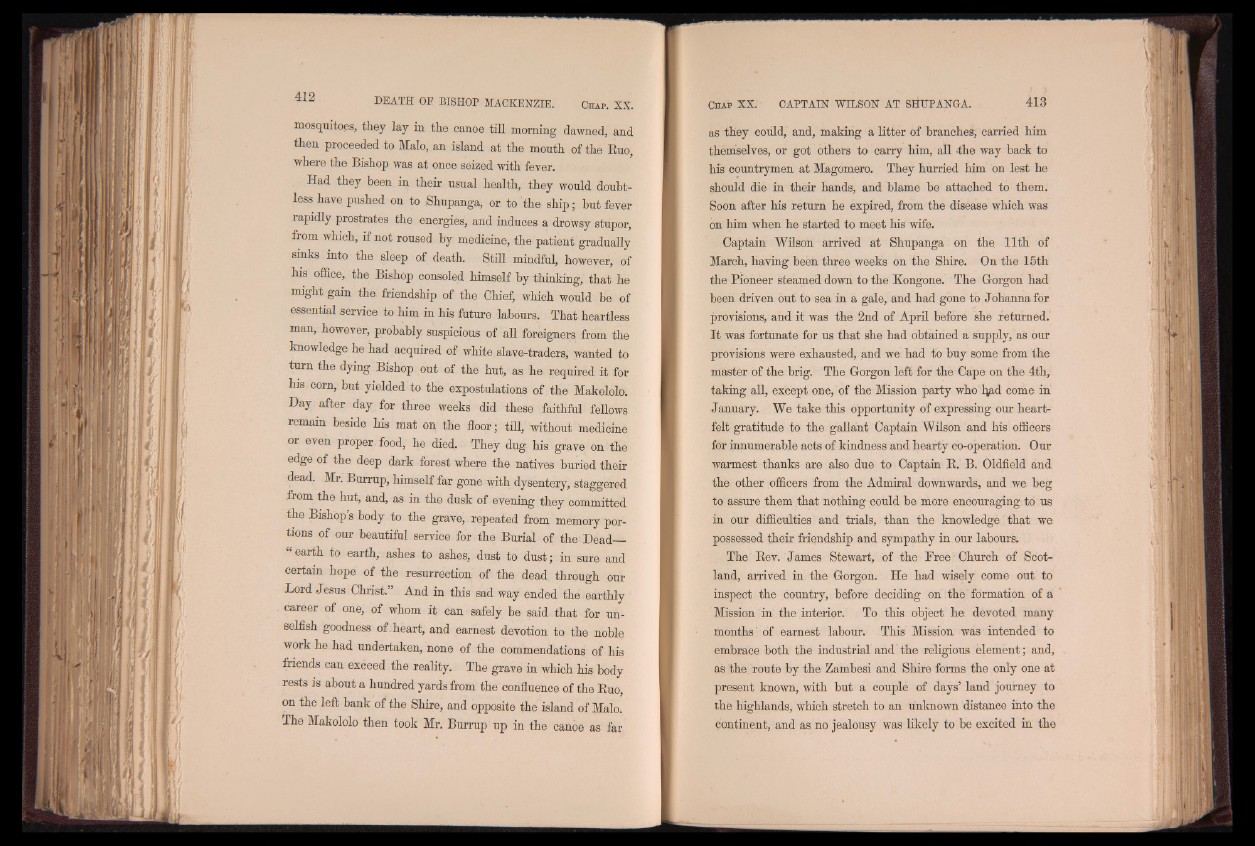
mosquitoes, they lay in the canoe till morning dawned, and
then proceeded to Malo, an island at the mouth of the Euo,
where the Bishop was at once seized with fever.
Had they been in their usual health, they would doubtless
have pushed on to Shupanga, or to the ship; but fever
rapidly prostrates the energies, and induces a drowsy stupor,
from which, if not roused by medicine, the patient gradually
sinks into the sleep of death. Still mindful, however, of
his office, the Bishop consoled himself by thinking, that he
might gain the friendship of the Chief, which would be of
essential service to him in his future labours. That heartless
man, however, probably suspicious of all foreigners from the
knowledge he had acquired of white, slave-traders, wanted to
turn the dying Bishop out of the hut, as he required it for
his corn, but yielded to the expostulations of the Makololo.
Day after day for three weeks did these faithful fellows
remain beside his mat on the floor; till, without medicine
or even proper, food, he died.. They dug his grave on the
edge of the deep dark forest where the natives buried their
dead. Mr. Burrup, himself far gone with dysentery, staggered
from the hut, and, as in the dusk of evening they committed
the Bishop’s body to the grave, repeated from memory portions
of our beautiful service for the Burial of the Dead—
“ earth to earth, ashes to ashes, dust to dust; in sure and
certain hope of the resurrection of the dead through our
Lord Jesus Chnst.” And in this sad way ended the earthly
career of one, of whom it can safely be said that for unselfish
goodness of .heart, and earnest devotion to the noble
work he had undertaken, none of the commendations of his
friends can exceed the reality. The grave in which his body
rests is about a hundred yards from the confluence of the Euo,
on the left bank of the Shire, and opposite the island of Malo.
The Makololo then took Mr. Burrup up in the canoe as far
as they coiild, and, making a litter of branches, carried him
themselves, or got others to carry him, all -the way back to
his countrymen at Magomero. They hurried him on lest he
should die in their hands, and blame be attached to them.
Soon after his return he expired, from the disease which was
on him when he started to meet his wife.
Captain Wilson arrived at Shupanga on the 11th of
March, having been three weeks on the Shire. On the 15th
the Pioneer steamed down to the Kongone. The Gorgon had
been driven out to sea in a gale, and had gone to Johanna for
provisions, and it was the 2nd of April before she returned.
It was fortunate for us that she had obtained a supply, as our
provisions were exhausted, and we had to buy some from the
master of the brig. The Gorgon left for the Cape on the 4th,
taking all, except one, of the Mission party who l^ad come in
January. We take this opportunity of expressing our heartfelt
gratitude to the gallant Captain Wilson and his officers
for innumerable acts of kindness and hearty co-operation. Our
warmest thanks are also due to Captain E. B. Oldfield and
the other officers from the Admiral downwards, and we beg
to assure them that nothing could be more encouraging to us
in our difficulties and trials, than the knowledge that we
possessed their friendship and sympathy in our labours.
The Eev. James Stewart, of the Free | Church of Scotland,
arrived in the Gorgon. He had wisely come out to
inspect the country, before deciding on the formation of a
Mission in the interior. To this object he devoted many
months ' of earnest labour. This Mission was intended to
embrace both the industrial and the religious element ; and,
as the route by the Zambesi and Shire forms the only one at
present known, with but a couple of days’ land journey to
thè highlands, which stretch to an unknown distance into the
continent, and as no jealousy was likely to be excited in the